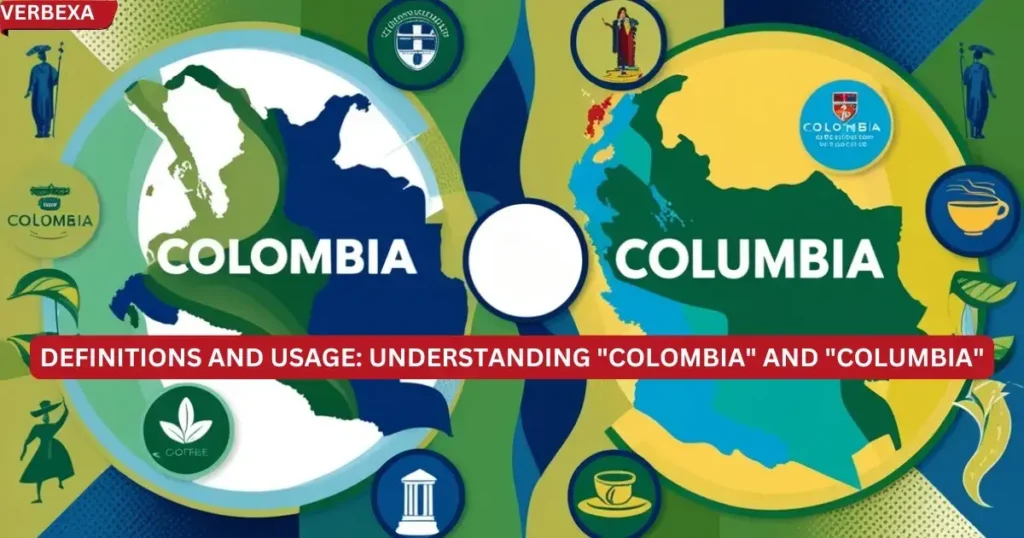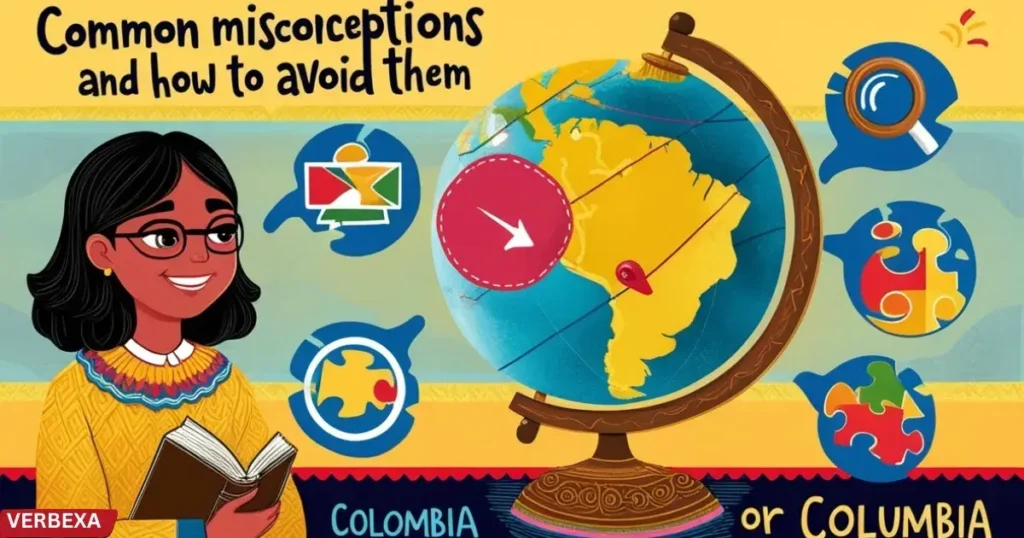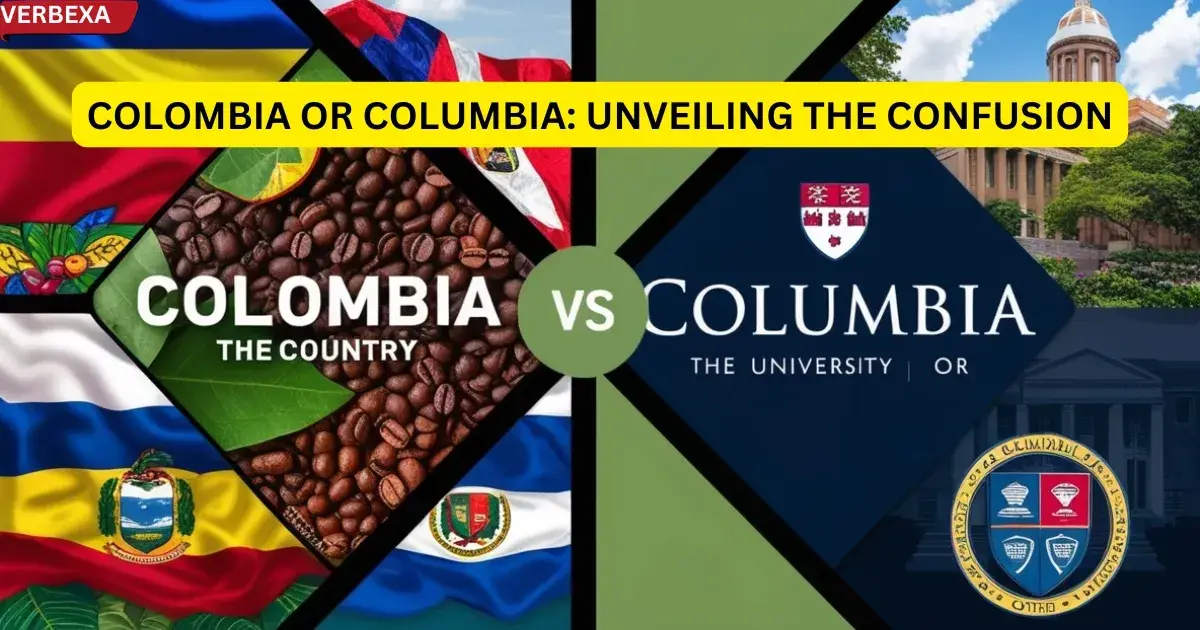When it comes to commonly confused terms, few create as much uncertainty as Colombia Or Columbia. This confusion isn’t just a simple spelling error – it can lead to significant misunderstandings in professional, academic, and cultural contexts. Whether you’re planning a trip to South America, researching Colombian coffee, or applying to Columbia University, understanding the distinction between these terms is crucial for clear communication.
Definitions and Usage: Understanding “Colombia” and “Columbia”

Colombia: The South American Nation
Colombia refers to a South American country, renowned for its stunning landscapes, vibrant culture, and significant contributions to the global coffee industry. It is located in the northern tip of South America, bordered by Venezuela, Brazil, Peru, Ecuador, Panama, and the Caribbean Sea.
The country is famous for its Colombian coffee, rich biodiversity, and bustling cities like Bogotá, Medellín, and Cartagena. The term Colombia is often associated with the country’s geographical context, its people, and tourism industry.
Columbia: North American Entities
On the other hand, Columbia is a term widely used in the United States and refers to various geographical locations, educational institutions, and historical namesakes.
For example, Columbia University is a prestigious Ivy League school located in New York City, while the Columbia River is a major river flowing through the Pacific Northwest. Additionally, Columbia has been used as a historical personification of the United States, symbolizing its independence and growth.
To sum up:
- Colombia is a country in South America.
- Columbia refers to locations, institutions, and historical symbols in North America.
Synonyms: Similar Words for Colombia and Columbia
Synonyms for Colombia:
- South American nation
- Colombian Republic
- Latin American country
- Coffee-producing country
- Colombian territory
- Tropical country
- Andean country
- Amazon region
- Spanish-speaking country
- Biodiversity hotspot
Columbia Synonyms:
- North American location
- U.S. historical symbol
- Ivy League university
- River system
- U.S. district
- U.S. city (Columbia, SC)
- Historic figure (Columbia as a personification)
- Education institution
- Record label (Columbia Records)
- Outdoor apparel brand (Columbia Sportswear)
Comparison Table: Colombia vs Columbia
| Aspect | Colombia | Columbia |
|---|---|---|
| Geographical Location | South America (bordered by Venezuela, etc.) | North America (various U.S. locations) |
| Cultural Context | Rich cultural heritage, vibrant festivals | Historical symbol for the United States |
| Major Institutions | Colombian government, universities (e.g., Universidad de los Andes) | Columbia University, Columbia Records, Columbia Sportswear |
| Famous Exports | Coffee (Colombian coffee), flowers, emeralds | Music (Columbia Records), outdoor gear |
| Language | Spanish (Colombian dialects) | English (U.S. English, academic context) |
| Pronunciation | /koh-LOHM-bee-ah/ | /koh-LUM-bee-ah/ |
Common Usage and Context

When to Use Colombia
Use Colombia when referring to the South American country. Here are a few contexts where the term is appropriate:
- Geographical Context: “I am planning to visit Colombia for a vacation next year.”
- Cultural Context: “The Colombian culture is known for its vibrant music, dance, and festivals.”
- Coffee Industry: “This is a bag of Colombian coffee; it’s known for its rich flavor.”
When to Use Columbia
On the other hand, Columbia should be used when talking about North American locations, historical references, or institutions. Here’s where it fits:
- Geographical Context: “I’m traveling to Columbia, South Carolina, for a conference.”
- Educational Institution: “He graduated from Columbia University in New York.”
- Historical Context: “The term Columbia was once used to personify the United States.”
Everyday Usage Examples
- Colombia: “Have you ever been to Colombia? The Colombian people are incredibly welcoming, and the biodiversity is outstanding.”
- Columbia: “If you’re interested in education, Columbia University offers great programs in the arts and sciences.”
- Colombia: “You can’t visit Colombia without trying the famous Colombian coffee.”
- Columbia: “I spent a summer in Columbia, Missouri, and visited the Columbia River nearby.”
Cultural and Historical Significance
Colombia’s Rich Heritage
The Republic of Colombia boasts a fascinating history and diverse culture, from the ancient civilizations that inhabited its lands to its modern status as a leader in coffee production and biodiversity. The country’s capital, Bogotá, serves as a hub for business, arts, and education in South America.
Columbia’s Historical Impact
The term Columbia has significant historical importance in North America, often used as a poetic name for the United States and appearing in numerous institutional names. The Columbian Exchange marked a crucial period in world history, though this term relates to Christopher Columbus rather than the country of Colombia.
Common Misconceptions and How to Avoid Them

To avoid confusion between Colombia Or Columbia, remember these key points:
- Colombia is always the correct spelling for the South American country
- Columbia is typically used in North American contexts
- When in doubt about Columbian or Colombian, remember that Colombian refers to anything relating to the country of Colombia
Travel and Tourism Context
When planning travel to Colombia, it’s essential to use the correct spelling in:
- Visa applications
- Flight bookings
- Hotel reservations
- Travel insurance documents
Language and Communication Tips
Columbian or Colombian Pronunciation
- Colombia: Co-LOM-bia (emphasis on “LOM”)
- Columbia: Co-LUM-bia (emphasis on “LUM”)
Writing Tips
- Always double-check the spelling when writing about either entity
- Consider the context to determine which spelling is appropriate
- When referring to people from Colombia, use “Colombian” not “Columbian”
FAQs
How to spell Colombia in Spanish?
In Spanish, Colombia is spelled exactly the same, with the emphasis on the second syllable: “Co-LOM-bia.”
How to spell Columbia?
Columbia is spelled with a “u” instead of an “o,” referring to various places or institutions in North America.
Is it spelled Columbian or Colombian?
The correct spelling is Colombian when referring to anything related to Colombia, including people or culture.
What do Colombians call themselves?
People from Colombia typically call themselves “Colombianos” in Spanish, meaning Colombians.
Conclusion: Clearing the Air on “Colombia Or Columbia”
The difference between Colombia Or Columbia is more than just a matter of spelling; it’s about understanding the geographical context, cultural references, and historical significance tied to each term. While Colombia is a beautiful South American country known for its culture, biodiversity, and Colombian coffee, Columbia has its roots in North American landmarks like the Columbia River, Columbia University, and even Columbia Records.
So next time you’re writing or speaking, remember to choose the right term based on the context. Whether you’re discussing Colombian tourism or admiring the Columbia flag, clarity is key. And when in doubt, just think of the old saying: “It’s Colombia, not Columbia.”
Now that you’ve understood the distinction between Colombia Or Columbia, you’ll be able to use both terms confidently in conversations or writing. Whether it’s exploring the wonders of Colombia, experiencing Colombian coffee, or delving into the legacy of Columbia University, you can be sure your message is clear and precise. Understanding Columbia vs Colombia and the subtle differences between Colombian vs Columbian will ensure that you’re always using the right term in the right context.

This author is a passionate linguist and grammar enthusiast, dedicated to helping individuals master the art of language. With years of experience in teaching and editing, she brings clarity and precision to every sentence. Tina’s mission is to empower writers of all levels to express themselves with confidence and excellence.

